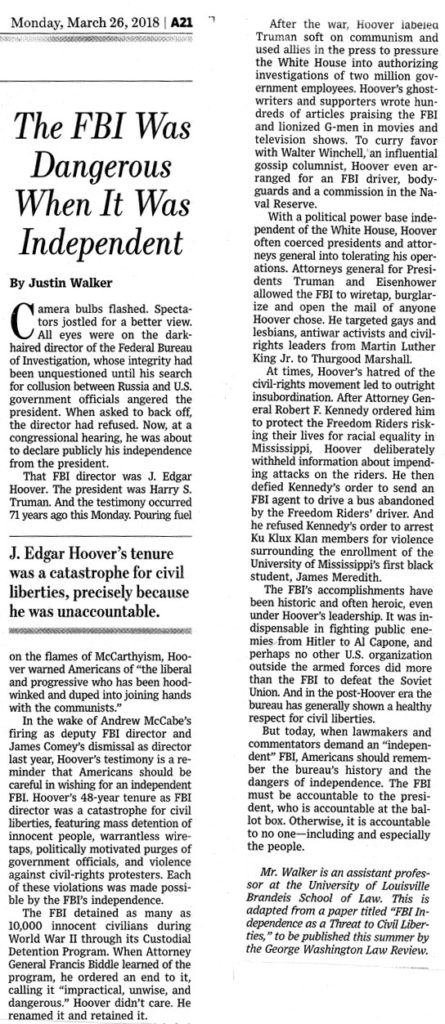This op-ed that appeared in the Wall Street Journal and below is my response to it.
RAYMOND BATVINIS, PhD RESPONSE:
I am writing in response to Professor Justin Walkers editorial entitled The FBI Was Dangerous When It Was Independent published in The Wall Street Journal on March 26, 2018.
I’ll start with Walker’s assertion that President Truman ordered Hoover to “back off” his investigation of so-called “collusion between Russia and US government officials” because it “angered the president.” Keeping the president happy, even a great one like Truman, is not the job of the FBI and that’s how Hoover saw it. And what the FBI director was investigating was not mere “collusion”; it was espionage.
By 1947 Igor Gouzenko, a military intelligence officer (GRU) working as a cipher clerk at the Soviet Embassy in Ottawa, Canada had been in the hands of Canadian authorities since his defection in August 1945. When he fled the embassy, he carried with him a cache of documents exposing a widespread network of GRU espionage agents throughout Canada and the United States. One pointed authorities to Alger Hiss, then a high – ranking State Department official, who had just arranged the San Francisco Conference which established the United Nations.
A month later the American born espionage courier, Elizabeth Bentley, defected to the FBI. She had carried thousands of stolen classified documents from Washington DC to the New York KGB station throughout the Second World War. Her priceless information describing Russian spies in the United States dating back to the 1930s included at least forty Americans burrowed deep inside dozens of key U.S. government agencies. They included such notable figures as assistant treasury secretary Harry Dexter White, White House economic advisor to President Roosevelt Laughlin Currie, and Duncan Lee, a senior assistant to General William Donovan, the director of the Office of Strategic Services. The record even exposes the KGB’s determined efforts to place sources close to Eleanor Roosevelt, the president’s wife.
Today, the proof is unimpeachable.
One only has to examine the Mitrokhin Archives, a treasure trove of thousands of documents, smuggled out of Moscow to Great Britain shortly after the collapse of the Soviet Union by the late KGB officer, Vasili Mitrokhin. Then there are the Vassiliev Notebooks recorded by former KGB officer turned journalist Alexander Vassiliev who was given unprecedented access to raw KGB files. And, finally there are the Venona cables, encrypted KGB and GRU messages sent between Moscow and its American stations which the National Security Agency deciphered over a forty – year period. Gouzenko, Bentley, Mitrokhin and Venona all confirm Hoover’s obligation to vigorously pursue Russian espionage after the war.
Next lets turn to Walker’s claim that Hoover “detained as many as 10,000 innocent civilians during World War II through the Custodial Detention Program.”
Hoover never held any aliens. Lets be clear about the FBI’s actions on the night of December 7, 1941 and the days that followed as well as Attorney General Francis Biddle’s participation in the process. For weeks Hoover’s senior staff and top Justice Department officials had been researching and preparing the legal paperwork for an enemy alien roundup in anticipation of war with Japan. As for Hoover, he had alerted his field office chiefs to be ready to take enemy aliens into custody only when signed orders were received from President Roosevelt. At approximately 7 pm on the night of December 7 FDR, resting in his White House bedroom, signed Proclamation 2525 in the presence of Solicitor General Charles Fahy (then substituting for Biddle who was returning to Washington, DC from a Detroit speaking engagement.).
Years later Fahy still vividly recalled that moment when an exhausted FDR, still in a state of shock over the Pearl Harbor catastrophe, simply told Fahy “Now get done what needs to be done.” Informed that the order had been signed Hoover signaled his field offices and the FBI roundup began. The Japanese enemy aliens were immediately turned over to the Immigration and Naturalization Service for hearings to determine if they should remain in custody. As for Biddle – regardless of how he later felt he was involved from the beginning in the Custodial Detention process.
As for Walker’s third claim that Hoover’s actions poured fuel on the flames of McCarthyism it might be useful to point out that George Mason University historian, Arthur Herman, wrote that Robert Kennedy admired McCarthy and even took a position as assistant counsel on Senator Joseph McCarthy’s Senate Government Operations Committee working for Roy Cohn.
And lastly a word about Hoover’s so-called defiance of then Attorney General Kennedy’s order to have FBI agents protect Freedom Riders and arrest Ku Klux Klansmen. The few toothless civil rights laws that existed at the time gave no authority for the FBI to serve as bodyguards for Freedom Riders nor arrest Klansmen for what were then local violations of the law.
J. Edgar Hoover was a great American. Certainly, one of the most important and controversial figures of the twentieth century. But like all great leaders he had great strengths as well as great weaknesses.
Mr. Walker is entitled to his opinions about James Comey, Andrew McCabe and J. Edgar Hoover. But he is not entitled to his own facts.
Raymond J. Batvinis, PhD is the author of “The Origins of FBI Counterintelligence” and “Hoover’s Secret War Against Axis Spies: FBI Counterintelligence During World War II.”

You must be logged in to post a comment.